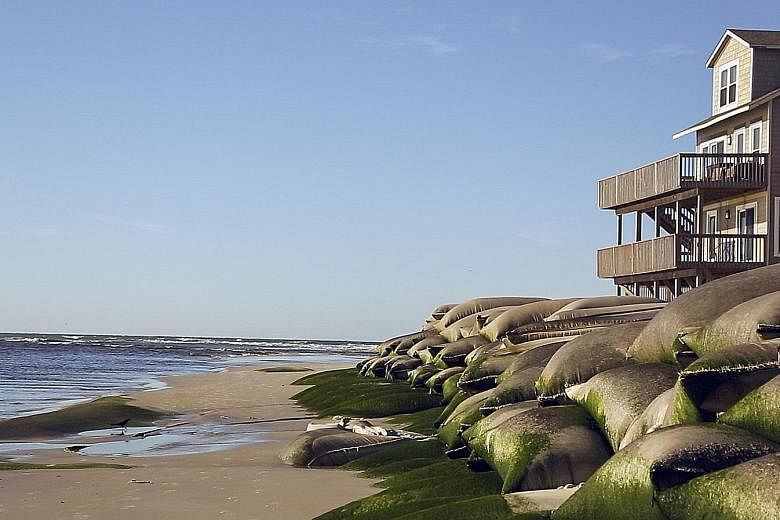MIAMI • Real estate agents looking to sell coastal properties usually focus on one thing: how close the home is to the water's edge. But buyers are increasingly asking instead how far back it is from the water line. How many feet above sea level? Is it fortified against storm surges? Does it have emergency power and sump pumps?
Rising sea levels are changing the way people think about waterfront real estate. Though demand remains strong and developers continue to build near the water in many coastal cities, home owners across the United States are slowly growing wary of buying property in areas most vulnerable to the effects of climate change.
A warming planet has already forced a number of industries - coal, oil, agriculture and utilities among them - to account for potential future costs of a changed climate. The real estate industry, particularly along the vulnerable coastlines, is slowly awakening to the need to factor in the risks of catastrophic damage from climate change, including that wrought by rising seas and storm-driven flooding.
But many economists say that this reckoning needs to happen much faster and that home buyers urgently need to be better informed. Given that 40 per cent of Americans live and work in coastal areas, some analysts say the economic impact of a collapse in the waterfront property market could surpass that of the bursting dot.com and real estate bubbles of 2000 and 2008.
The fallout would be felt by property owners, developers, real estate lenders and financial institutions that bundle and resell mortgages.
Over the past five years, home sales in flood-prone areas grew about 25 per cent less quickly than in counties that do not typically flood, according to county-by-county data from Attom Data Solutions, the parent company of RealtyTrac. Many coastal residents are rethinking their investments and heading for safer ground.
"I don't see how this town is going to defeat the water," said Mr Brent Dixon, a resident of Miami Beach who plans to move north and away from the coast in anticipation of worsening king tides, the highest predicted tide of the year.
"The water always wins."
These concerns have taken on a new urgency since the presidential election of Mr Donald Trump, who has long been a sceptic of global warming, claiming in 2012 that it was a concept "created by and for the Chinese in order to make US manufacturing non-competitive".
A real estate developer, Mr Trump is the owner of several South Florida properties, including Mar-a-Lago, an 8ha site that stretches between the Atlantic Ocean and the Intracoastal Waterway.
Mr Trump's recent selection of Mr Myron Ebell to lead his Environmental Protection Agency transition team intensified these worries in Florida and among many climate scientists. Mr Ebell has helped lead the charge against the scientific consensus that global warming exists and is caused by people.
State lawmakers in Massachusetts and New Jersey are pushing to impose new rules on real estate agents and others, obligating them to disclose climate-related damage such as previous flooding.
Banks and insurers need to protect their collateral and investors more by improving their methods for estimating climate change risks and creating more standardised rules for reporting them publicly, economists warn.
In April, Mr Sean Becketti, the chief economist for Freddie Mac, the US government-backed mortgage giant, issued a dire prediction. It is only a matter of time, he wrote, before sea-level rise and storm surges become so unbearable along the coast that people will leave, ditching their mortgages and potentially triggering another housing meltdown - except this time, it would be unlikely that these housing prices would ever recover.
"Some residents will cash out early and suffer minimal losses," he wrote. "Others will not be so lucky."
NYTIMES

